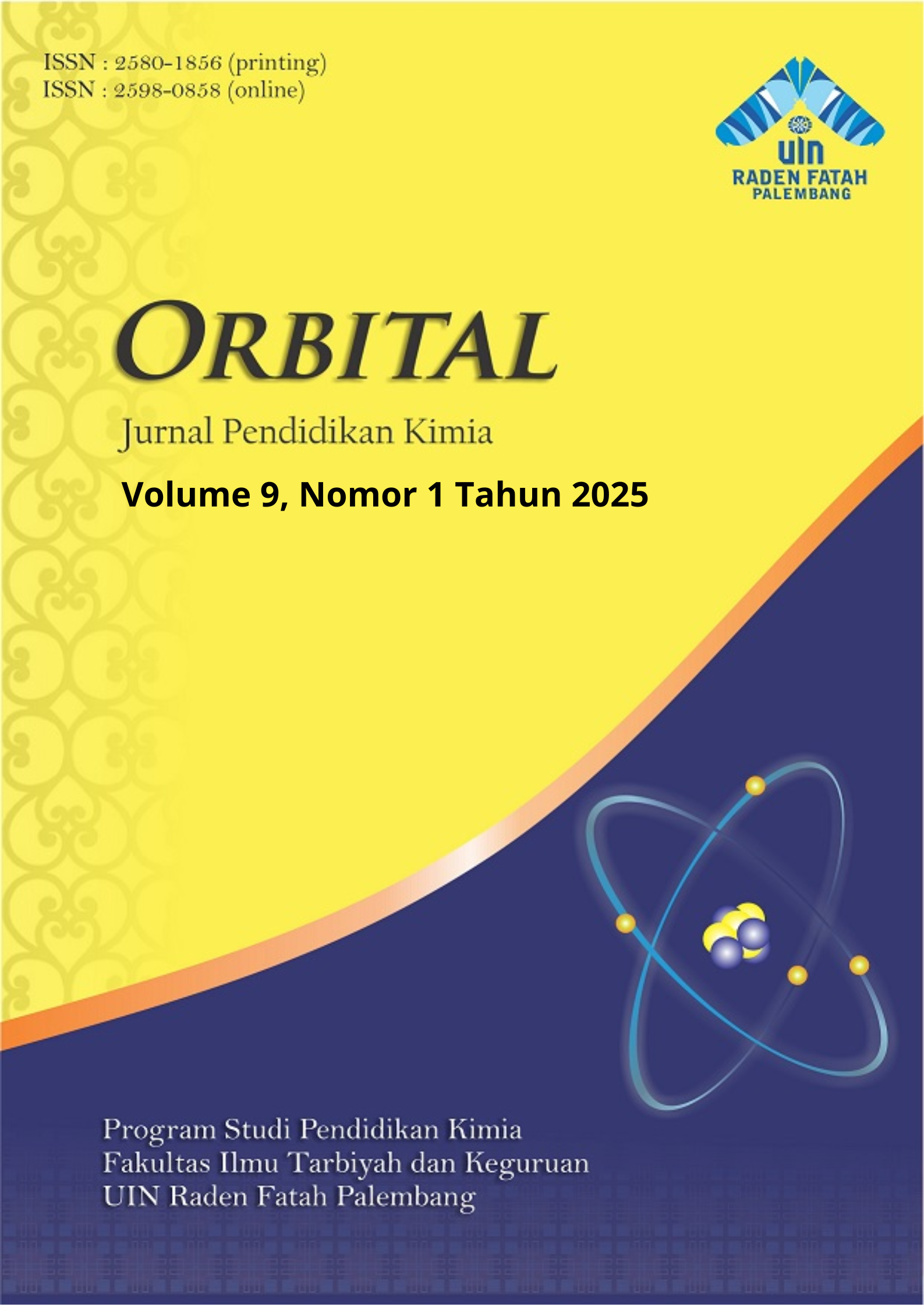E-Module Learning Cycle 5E Oriented Education for Sustainable Development on Reaction Rate Material to Increase Sustainable Consciousness
Main Article Content
Abstract
The energy resource crisis and environmental damage continue to be very serious global issues as a result of people's behavior that is not sustainable in terms of the environment. Education through the concept of ESD (Education for Sustainable Development), plays an important role in instilling sustainable consciousness to realize the SDGs, namely by integrating them in learning. The purpose of this study is to generate and determine the effectiveness of using ESD-oriented reaction rate learning modules in increasing sustainability consciousness. This development was carried out using the ADDIE method using readability instruments and pretest-posttests that had been validated by experts. This study has a limitation in terms of the number of participants involved, which was only 36 students. To analyze the pretest-posttest data, the N-gain Score test was used. The resulting product is an ESD-based reaction rate interactive learning module in digital form (website). The developed learning module received a high validation of 82.7% from expert validators, including the "very good" category. The student readability test score was also very high, reaching 86.46%. The results of the implementation of the module obtained an N-gain value of 0.5752, so this module can be categorized as "quite effective" in increasing students' sustainable consciousness.
Article Details

This work is licensed under a Creative Commons Attribution-ShareAlike 4.0 International License.
How to Cite
References
Agusti, M., & Solikhin. (2021). Pengembangan e-modul kimia menggunakan exe-learning berbasis learning cycle 5e pada materi larutan penyangga. Alotrop, 5(2), 198–205. https://doi.org/10.33369/atp.v5i2.17240
Berglund, T., Gericke, N., & Chang Rundgren, S. N. (2014). The implementation of education for sustainable development in sweden: investigating the sustainability consciousness among upper secondary students. Research in Science and Technological Education, 32(3), 318–339.
Branch, R. M. (2009). Instructional design: The ADDIE aproach. Springer Science Business Media.
Burmeister, M., & Eilks, I. (2012). An example of learning about plastics and their evaluation as a contribution to education for sustainable development in secondary school chemistry teaching. Chemistry Education Research and Practice, 13(2), 93–102.
Djadir, H., Upu, & Rezky, A. (2021). Model pembelajaran learning cycle 5e (engage, explore, explain, elaboration, evaluate) berbasis daring dalam pembelajaran matematika. Seminar Nasional Hasil Penelitian, 1931–1943.
Fibonacci. (2020). Development of education for sustainable development (esd) based chemsdro mobile based learning for indonesian junior high school: rate of reaction. Jurnal Tadris Kimiya, 5(1), 26–34. https://doi.org/10.15575/jtk.v5i1.5908
Firdaus, N. M. (2017). Analisis pengaruh kualitas sistem, kualitas informasi dan kualitas layanan platform pembelajaran daring terhadap kepuasan pengguna. Jurnal Teknologi Dan Manajemen Informatika, 10(1), 1–10. https://doi.org/https://doi.org/10.26905/jtmi.v10i1.12294
Gericke, J., & Pauw, B. (2019). The sustainability consciousness questionnaire: the theoretical development and empirical validation of an evaluation instrument for stakeholders working with sustainable development. Sustainable Development, 27(1), 35–49.
Hanikah, H., Faiz, A., Nurhabibah, P., & Wardani, M. A. (2022). Penggunaan media interaktif berbasis ebook di sekolah dasar. Jurnal Basicedu, 6(4), 7352–7359.
Laurie, R., & Nonoyama, T. (2016). Contributions of education for sustainable development (esd) to quality education: a synthesis of research. Journal of Education for Sustainable Development, 10, 226–242. https://doi.org/10.1177/0973408216661442
Michael, H., & Sumilan. (2020). Sustainable development concept awareness among students in higher education: a preliminary study. Journal of Sustainability Science and Management, 15(7), 113–122. https://doi.org/10.46754/jssm.2020.10.011
Michalos, H., & Creech. (2012). Measuring knowledge, attitudes and behaviours concerning sustainable development among tenth grade students in manitoba. Social Indicators Research, 106(2), 213–238. https://doi.org/10.1007/s11205-011-9809-6
Munir, M. (2012). Multimedia. CV. Alfabeta.
Muthia, M. G., & Nugraha. (2021). Materi getaran harmonik sederhana untuk siswa sma. Wahana Pendidikan Fisika, 6(2), 204–210.
Mutmainnah. (2021). Efektivitas Media Pembelajaran E-module Berbasis STM (Sains Teknologi Masyarakat) Dalam Meningkatkan Hasil Belajar Siswa Pada Materi Laju Reaksi. Universitas Islam Negeri Sultan Syarif Kasim Riau Pekanbaru.
Ovais. (2023). Students’ sustainability consciousness with the three dimensions of sustainability: Does the locus of control play a role? Regional Sustainability, 4(1), 13–27. https://doi.org/10.1016/j.regsus.2023.02.002
Perkasa, M., & Aznam, N. (2016). Pengembangan SSP kimia berbasis pendidikan berkelanjutan untuk meningkatkan literasi kimia dan kesadaran terhadap lingkungan. Jurnal Inovasi Pendidikan IPA, 2(1), 46–67. https://doi.org/10.21831/jipi.v2i1.10269
Radha, & Arumugam, J. (2023). Integrating the sustainable development goals (sdgs) in the curriculum and strengthening teacher training programs to align with NEP 2020. Shanlax International Journal of Education, 11(4), 63–68. https://doi.org/10.34293/pendidikan.v11i4.6302
Rati, F., Rohiat, S., & Elvinawati, E. (2022). Pengembangan multimedia pembelajaran interaktif berbasis problem based learning (pbl) menggunakan aplikasi articulate storyline pada materi ikatan kimia. Alotrop, 6(1), 70–79. https://doi.org/10.33369/alo.v6i1.21799
Rejeki, D. P. (2015). Penerapan model pembelajaran learning cycle 5e dalam meningkatkan hasil belajar dan sikap siswa pada sman 1 krueng barona jaya. Visipena Jurnal, 7(2), 15–23. https://doi.org/10.46244/visipena.v7i2.305
Rieckmann, M. (2017). Education for sustainable development goals (sdgs)-roundtable of network 30 eser "environmental and sustainability education research in the context of the sustainable development goals: implications for an educational reform agenda. European Conference on Educational Research (ECER).
Romayanti, C. (2020). Pengembangan e-modul kimia berbasis kemampuan berpikir kreatif dengan menggunakan kvisoft flipbook maker. Jurnal Pendidikan Dan Ilmu Kimia, 4(1), 51–58. https://doi.org/10.33369/atp.v4i1.13709
Sapitri, D., & Bentri, A. (2020). Pengembangan media pembelajaran berbasis aplikasi articulate storyline pada mata pelajaran ekonomi kelas x sma. Inovtech, 2(1), 1–8. https://doi.org/10.24036/inovtech.v2i01.115
Saputra, W. W. F., & Faizah, U. N. (2021). Pembelajaran learning cycle 5e dan pendekatan ssd terhadap peningkatan kemampuan membuat keputusan peserta didik. Jurnal Tadris IPA Indonesia, 1(3), 343–353.
Shantini, Y. (2016). Penyelenggaraan esd dalam jalur pendidikan di indonesia. Pedagogia Jurnal Ilmu Pendidikan, 13(1), 136–143. https://doi.org/10.17509/pedagogia.v13i1.3385
Sukarelawa, M. I. (2024). N-gain vs stacking analisis perubahan abilitas siswa dalam desain one group pretest-posttest. Suryacahya.
UNESCO. (2017). Education for sustainable development goals: learning objectives. United Nation Educational, Scientific and Cultural Organization.
Wiyana, F. A. (2023). Pengetahuan mahasiswa universitas pendidikan indonesia terhadap sustainable development goals. Indonesian Journal of Multidisciplinary, 1(2), 612–622.
Yuniastuti. (2021). Media pembelajaran untuk generasi milenial tinjauan teoritis dan pedoman praktis. Scopindo Media Pustaka.

